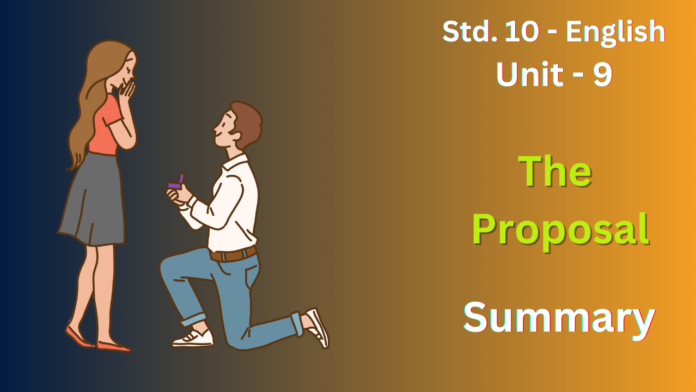The Proposal
Here’s a summary of the chapter “The Proposal” from your 10th standard English subject:
Characters:
- Ivan Lomov: A nervous and wealthy landowner who proposes to his neighbor’s daughter.
- Natalya Stepanovna: The young woman Lomov proposes to.
- Stepan Chubukov: Natalya’s father, also a wealthy landowner.
The Proposal:
- Lomov, dressed formally, arrives at Chubukov’s house, determined to propose to Natalya.
- Chubukov initially mistakes Lomov’s visit for a request for money, causing some confusion.
- When Lomov clarifies his intention to propose, Chubukov readily welcomes it.
The Argument:
- The seemingly simple proposal gets derailed by Lomov’s nervousness and the argumentative nature of all three characters.
- Lomov and Chubukov launch into a heated debate about their hunting dogs, each claiming theirs is superior.
- Lomov suffers from palpitations and faints due to his anxiety.
The (Eventual) Acceptance:
- Despite the chaos, Natalya enters the room and expresses her interest in Lomov’s proposal.
- While the arguing resumes (now including Natalya!), Chubukov readily puts his daughter’s hand in Lomov’s, finalizing the engagement.
Themes:
- Marriage for Status: The play satirizes the tendency of wealthy families to arrange marriages based on social status and economic gain rather than genuine love.
- Communication Breakdown: The characters’ constant arguments showcase a comical communication breakdown despite their common goal.
- Social Commentary: The play humorously portrays the anxieties and social awkwardness surrounding proposals and marriage in that era.
Thinking About the Play
1. What does Chubukov at first suspect that Lomov has come for? Is he sincere when he later says ‘And I’ve always loved you, my angel, as if you were my own son”? Find reasons for your answer from the play.
Ans : Chubukov initially suspects Lomov seeks a loan, likely due to Lomov’s formal attire and Chubukov’s past experiences. His later declaration of love for Lomov seems insincere. The play suggests marriages were for social gain, and Chubukov’s quick shift in attitude and focus on the potential match point towards his primary concern being securing a good marriage for his daughter.
2. Chubukov says of Natalya: “……. as if she won’t consent! She’s in love; egad, she’s like a lovesick cat……” Would you agree? Find reasons for your answer.
Ans : Chubukov claims Natalya is lovesick for Lomov. While Natalya shows concern for Lomov’s fainting, the play lacks evidence of prior affection. Their interactions are full of arguments. Her desire for his return could be to end the chaos, not necessarily due to romantic feelings. Given Chubukov’s desire for a good match, his statement might be wishful thinking rather than reflecting Natalya’s true emotions.
Question 3.
1. Find all the words and expressions in the play that the characters use to speak about each other, and the accusations and insults they hurl at each other. (For example, Lomov in the end calls Chubukov an intriguer; but earlier,Chubukov has himself called Lomov a “malicious, doublefaced intriguer.” Again, Lomov begins by describing Natalya as “an excellent housekeeper, not bad-looking, well-educated.”)
2. Then think of five adjectives or adjectival expressions of your own to describe each character in the play.
3. Can you now imagine what these characters will quarrel about next?
Ans :
1. Name-Calling and Accusations:
Here’s a breakdown of how the characters speak about each other in “The Proposal”:
- Lomov about Chubukov: Malicious, double-faced intriguer, short-legged, a fraud, deaf as a post.
- Chubukov about Lomov: A whiner, hypochondriac, skinny, faints all the time.
- Natalya about Lomov: Irritating, stubborn, talks too much.
- Natalya about Chubukov: Meddlesome, embarrassing.
2. Character Traits:
- Lomov: Nervous, anxious, proud, high-strung, hypersensitive.
- Chubukov: Hot-headed, argumentative, materialistic, status-conscious, impatient.
- Natalya: Feisty, quick-witted, exasperated, pragmatic, potentially independent.
3. Potential Future Quarrels:
Based on their personalities, here are some possibilities for future arguments:
- Wedding arrangements: Disagreements on guest lists, decorations, or financial contributions.
- Lomov’s health: Chubukov might mock Lomov’s hypochondria, leading to tension.
- Social etiquette: Differences in opinion on proper social behavior could spark arguments.
- Management of finances: If Lomov is indeed a poor manager as Chubukov implies, disagreements about money could arise.
Thinking About the Language
I
1. This play has been translated in English from the Russian original. Are there any expressions or ways of speaking that strike you as more – Russian than English?
For example would an adult man be addressed by an older man as my darling or my treasure in an English play?
Ans : “The Proposal’s” translation likely toned down some expressions for English ears. Terms like “my darling” might be natural in a Russian original but sound odd in English for an older man to address another adult male. The play’s formality could also be a result of translating a more formal Russian text. Translation nuances are tricky – what’s idiomatic or culturally appropriate in one language might sound strange in another.
2. You must have noticed that when we report someone’s exact words, we have to make some changes in the sentence structure. In the following sentences fill in the blanks to list the changes that have occurred in the above pairs of sentences. One has been done for you.
Questions.
- To report a question, we use the reporting verb asked (as in sentence set 1).
- To report a declaration, we use the reporting verb
- The adverb of place here changes to _____
- When the verb in the direct speech is in the present tense, the verb in reported speech is in the tense (as in sentence set 3).
- If the Verb in direct speech is in the present continuous tense, the verb in reported speech changes to ____ tense. For example, ____ changes to was getting.
- When the sentence in direct speech contains a word denoting respect, we add the adverb ____ in the reporting clause (as in sentence set 1)
- The pronouns I, me, our and mine, which are used in the first person in direct speech, change to third person pronouns to such as _____ or ____ in reported speech.
Ans:
2 . declared
3. there
4. past
5. past continuous, is getting
6. respectfully
7. he, him, their or his


